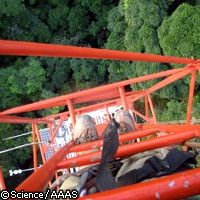Breathing new life into climate models
Findings from two large-scale EU-funded studies are set to change the way scientists view the relationship between Earth's climate and the carbon cycle. One report provides an estimate of the total amount of photosynthesis (which takes up carbon dioxide - CO2) that takes place each year, and the other quantifies the effects of temperature on global respiration (which releases CO2). The new estimates will substantially improve existing models used to study interactions between CO2 and the climate. Both studies received funding from the CARBOEUROPE IP ('Assessment of the European terrestrial carbon balance') project, financed with EUR 16.3 million from the 'Sustainable development, global change and ecosystems' Thematic area of the Sixth Framework Programme (FP6). CARBOEUROPE IP project partners seek to understand, quantify and predict Europe's terrestrial carbon balance. In addition, the scientists used data from FLUXNET, an international initiative that also receives funding from the EU to monitor exchanges of CO2 between Earth's ecosystems and the atmosphere. One international study, led by researchers from Germany's Max Planck Institute for Biogeochemistry, examined the Earth's Gross Primary Production (GPP), the total amount of CO2 that terrestrial plants consume through photosynthesis each year. Christian Beer and colleagues explain that together with respiration, GPP is one of the major processes controlling land-atmosphere CO2 exchange. As such, it enables the capacity of terrestrial ecosystems to partly offset anthropogenic CO2 emissions. Until now, only tentative observation-based estimates of global terrestrial GPP were possible. 'An understanding of the factors that control the GPP of various terrestrial ecosystems is important because we humans make use of many ecosystem services, such as wood, fibre, and food,' explained Dr Beer. 'Additionally, such an understanding is important in the context of climate change as a consequence of CO2 emissions from burning fossil fuels because vegetation greatly modulates the land-atmosphere exchanges of greenhouse gases, water, and CO2.' The scientists made use of new data streams and combined the strengths of five different diagnostic models to study GPP during the period 1998-2005. They pooled large amounts of data from FLUXNET, a network that coordinates regional and global analyses of observations from micro-meteorological tower sites. The tower sites measure exchanges of CO2, water vapour and energy between terrestrial ecosystems and the atmosphere. Dr Beer and colleagues estimate that 123 billion tonnes of CO2 are removed from the atmosphere by terrestrial plants each year. The researchers also established that CO2 uptake is most pronounced (34%) in tropical forests, and that savannas account for approximately 26% of global CO2 uptake. Rainfall is an important factor in GPP estimation, as it influences the amount of carbon that plants use for photosynthesis on more than 40% of vegetated lands. This finding has particular significance, as large variation is seen between traditional climate models, with some overestimating the influence of rainfall on GPP. 'We reached a milestone with this paper by using plenty of data from FLUXNET in addition to remote sensing and climate reanalysis,' said Dr Beer. 'With our estimation of global GPP, we can do two things: compare our results with [Earth system] process models and further analyse the correlation between GPP and climate.' The precise effect of air temperature on global respiration (whereby organisms return CO2 to the atmosphere), commonly referred to as Q10, has been a matter of long-standing debate. Most studies suggest that global respiration is highly sensitive to temperature; however, most predictive models suggest otherwise. Another international study led by Dr Miguel Mahecha, also from the Max Planck Institute for Biogeochemistry, establishes the effects of short-term variations in air temperature on the release of CO2 from plants back into the atmosphere. Based on observations from 60 different FLUXNET sites, they show that the Q10 value is independent of average global temperatures, regardless of specific ecosystem conditions. One shortcoming of previous predictive models, the researchers observed, was their failure to implement consistent time scales. Dr Mahecha and colleagues analysed the respiration of 60 different ecosystems on the exact same time scale, and determined a Q10 value of 1.4. The study provides evidence that there is a universal, intrinsic temperature sensitivity of terrestrial ecosystem respiration. Additional factors, such as the slow transformation of carbon in the soil and water availability, also play crucial roles in the carbon balance over the long term. 'Our key finding is that the short-term temperature sensitivity of ecosystem respiration to air temperature is converging to a single, global value,' explained Dr Mahecha. 'Contrary to previous studies, we show that the sensitivity of ecosystem respiration to temperature variations seems to be independent from external factors and constant across ecosystems. In other words, we found a general relationship between variation in temperature and ecosystem respiration... Our findings reconcile the apparent contradictions of modelling and field studies.' Taken together, the new estimates will help improve predictive models, which enable scientists to quantify the effects of the carbon cycle on Earth's ever-changing climate. The findings provide scientists with important tools for better understanding the world's ecosystems.
Countries
Germany

